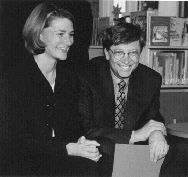
|
Office of News and Information Johns Hopkins University 3003 N. Charles Street, Suite 100 Baltimore, Maryland 21218-3843 Phone: (410) 516-7160 Fax (410) 516-5251 May 25, 1999 FOR IMMEDIATE RELEASE |
MEDIA CONTACTS: Dennis O'Shea, (410) 516-7160 pager (410) 512-1903; dro@jhu.edu or Lisbeth Pettengill, for the School of Public Health (410) 955-6878; lpetteng@jhsph.edu or Trevor Neilson, for the foundations (425) 882-1200 x28 or (206) 465-7194 trevor@glf.org |
Johns Hopkins $20 Million
Gift to School of Public Health for Population,
Reproductive Health Institute
 The
Bill and Melinda Gates Foundations have committed $20
million to
create the Bill and Melinda Gates Institute for Population and
Reproductive
Health at the Johns Hopkins University
School of Public Health.
The
Bill and Melinda Gates Foundations have committed $20
million to
create the Bill and Melinda Gates Institute for Population and
Reproductive
Health at the Johns Hopkins University
School of Public Health.The gift reflects the commitment of the foundations, established by Microsoft Corp. chairman Bill Gates and his wife, Melinda French Gates, to invest in global health projects. It builds on the foundations' 1997 commitment of $2.25 million to the school, which established a training and research program for family planning and reproductive health specialists from developing nations. That program will be the foundation for the new institute.
"The response from the developing world to family and reproductive health initiatives launched with the original Gates Foundations gift has been dramatic," said William R. Brody, president of Johns Hopkins. "This exciting new level of support from the foundations allows our faculty to begin to meet the really overwhelming demand in these nations for home-grown expertise. We are most grateful to Bill and Melinda Gates for making this possible."
Drawing on broad expertise from within the School of Public Health and throughout the university, the institute over the next five years will bring scholars from Latin America, Asia and Africa to Hopkins to earn advanced degrees. It will also provide fellows with leadership training, either in Baltimore or in their home countries. The institute will give continuing support to the fellows once they return to work at home, in part by providing computer- and Web-based access to distance learning programs. It will also seek to strengthen the public health infrastructure that enables the fellows to do their work, cooperating with institutions in the developing world to help them become resources for expertise and training within their own regions.
The institute will also initiate research collaborations, train scientists in information systems technology and data management, and promote a sharing of "lessons learned" between the developing world and impoverished areas of Baltimore.
"Major advances could be made toward solving global problems in population and reproductive health if countries around the world could put in place appropriate, cost-effective service delivery programs," said Alfred Sommer, dean of the School of Public Health. "The problem is not technology alone but the need for trained professionals, researchers, and technicians. The institute will provide that training."
 Laurie Schwab Zabin, principal investigator on the project and a
professor
of population and family
health sciences at Johns Hopkins, said
the Gates
gift recognizes that "building capacity, investing in human and
institutional development, is the greatest contribution we can
make."
Laurie Schwab Zabin, principal investigator on the project and a
professor
of population and family
health sciences at Johns Hopkins, said
the Gates
gift recognizes that "building capacity, investing in human and
institutional development, is the greatest contribution we can
make."
Global population grows by 100 million each year, Zabin said. More than 100 million women who want to delay childbearing or have no more children do not have access to contraception, she said. Death and disability due to childbearing are major health problems in the developing world.
"We are so grateful that the Gates Foundations have helped bring to life our shared vision of what an academic institution can do to address these issues through a combination of scholarship and science," Zabin said.
W. Henry Mosley, a professor of population and family health sciences, will co-direct the institute with Zabin until an international search for a permanent director is completed. The Department of Population and Family Health Sciences has long led worldwide research and training in population and public health, following a School of Public Health tradition of integrating graduate education with operational programs.
Across the university, Johns Hopkins combines disciplinary research in basic, population-based, social, and managerial sciences with large applied programs in international health. These programs include the Center for Communication Programs, which provides health education via mass media in the developing world, and JHPIEGO, which educates health personnel in the developing world.
With the Gates Foundations' $20 million grant, total commitments to the Johns Hopkins Initiative have reached $1.2 billion, the campaign's overall goal. Scheduled to conclude in June 2000, the campaign will continue to focus on ongoing needs, particularly student aid, the libraries, and facilities.
The Johns Hopkins School of Public Health is the oldest and largest school of public health in the world. It houses nine academic departments and 30 centers and institutes. The school is dedicated to the education of research scientists and public health professionals, a process inseparably linked to the discovery and application of new knowledge; and through these activities, to the improvement of health and prevention of disease and disability around the world.
|
Johns Hopkins University news releases can be found on the
World Wide Web at
http://www.jhu.edu/news_info/news/ Information on automatic e-mail delivery of science and medical news releases is available at the same address.
|
 Go to
Giving and Alumni News Home Page
Go to
Giving and Alumni News Home Page
 Go to
Headlines@HopkinsHome Page
Go to
Headlines@HopkinsHome Page